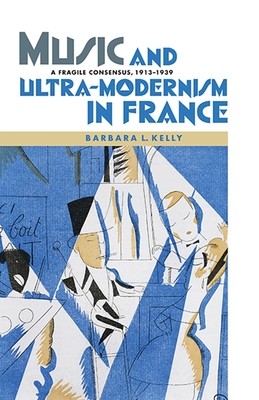
- We will send in 10–14 business days.
- Author: Barbara L Kelly
- Publisher: Boydell Press
- ISBN-10: 1843838109
- ISBN-13: 9781843838104
- Format: 16.3 x 23.9 x 2.3 cm, hardcover
- Language: English
- SAVE -10% with code: EXTRA
Music and Ultra-Modernism in France: A Fragile Consensus, 1913-1939 (e-book) (used book) | bookbook.eu
Reviews
Description
Exploring the ideas of consensus, resistance and rupture, this book contributes an important and nuanced reflection to the current debate on modernism in music.
Music and Ultra-Modernism in France examines the priorities of three generational groupings: the pre-war Société Musicale Indépendente of Ravel and his circle, Les Six in the 1920s and Jeune France in 1936. Exploring the ideas of consensus, resistance and rupture, the book contributes an important and nuanced reflection to the current debate on modernism in music. It considers the roles composers, critics and biographers played in shaping debates about contemporary music, showing how composers including Ravel, Poulenc, Milhaud, Jolivet and Messiaen and critics such as Paul Landormy, André Coeuroy and Roland-Manuel often worked in partnership to bring their ideas to a publicforum. It also expands the notion of 'interwar' through the essential inclusion of World War I and the years before, reconfiguring the narrative for that period.This book challenges some of the stereotypes that characterisethe period, in particular, neo-classicism and the dominance of secularism. It shows how Stravinsky worked closely with Ravel, Satie and Poulenc and invited audiences and critics to rethink what it meant to be modern. The interwaryears were also marked by commemoration and loss. Debussy's wartime death in 1918 stimulated competing efforts (by Emile Vuillermoz, Léon Vallas and Henry Prunières) to shape his legacy. They were motivated by nostalgia for a lostand glorious generation and a commitment to building a legacy of French achievement. Music and Ultra-Modernism in France argues for the vitality of French music in the period 1913-39 and challenges the received view that the period and its musical culture lacked dynamism, innovation or serious musical debate. BARBARA L. KELLY is Professor of Music at Keele University.
EXTRA 10 % discount with code: EXTRA
The promotion ends in 20d.06:22:59
The discount code is valid when purchasing from 10 €. Discounts do not stack.
- Author: Barbara L Kelly
- Publisher: Boydell Press
- ISBN-10: 1843838109
- ISBN-13: 9781843838104
- Format: 16.3 x 23.9 x 2.3 cm, hardcover
- Language: English English
Exploring the ideas of consensus, resistance and rupture, this book contributes an important and nuanced reflection to the current debate on modernism in music.
Music and Ultra-Modernism in France examines the priorities of three generational groupings: the pre-war Société Musicale Indépendente of Ravel and his circle, Les Six in the 1920s and Jeune France in 1936. Exploring the ideas of consensus, resistance and rupture, the book contributes an important and nuanced reflection to the current debate on modernism in music. It considers the roles composers, critics and biographers played in shaping debates about contemporary music, showing how composers including Ravel, Poulenc, Milhaud, Jolivet and Messiaen and critics such as Paul Landormy, André Coeuroy and Roland-Manuel often worked in partnership to bring their ideas to a publicforum. It also expands the notion of 'interwar' through the essential inclusion of World War I and the years before, reconfiguring the narrative for that period.This book challenges some of the stereotypes that characterisethe period, in particular, neo-classicism and the dominance of secularism. It shows how Stravinsky worked closely with Ravel, Satie and Poulenc and invited audiences and critics to rethink what it meant to be modern. The interwaryears were also marked by commemoration and loss. Debussy's wartime death in 1918 stimulated competing efforts (by Emile Vuillermoz, Léon Vallas and Henry Prunières) to shape his legacy. They were motivated by nostalgia for a lostand glorious generation and a commitment to building a legacy of French achievement. Music and Ultra-Modernism in France argues for the vitality of French music in the period 1913-39 and challenges the received view that the period and its musical culture lacked dynamism, innovation or serious musical debate. BARBARA L. KELLY is Professor of Music at Keele University.


Reviews